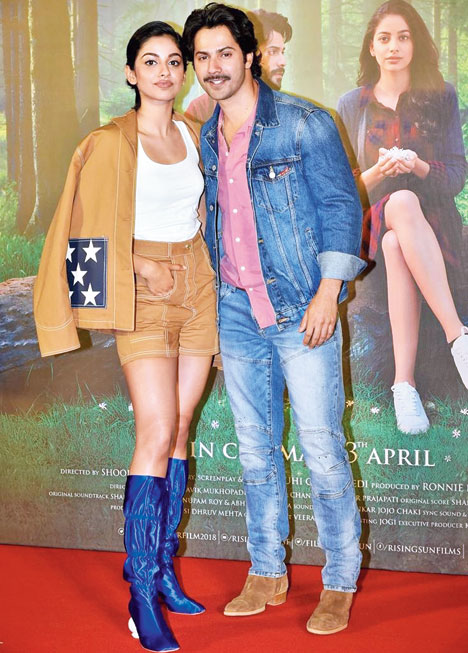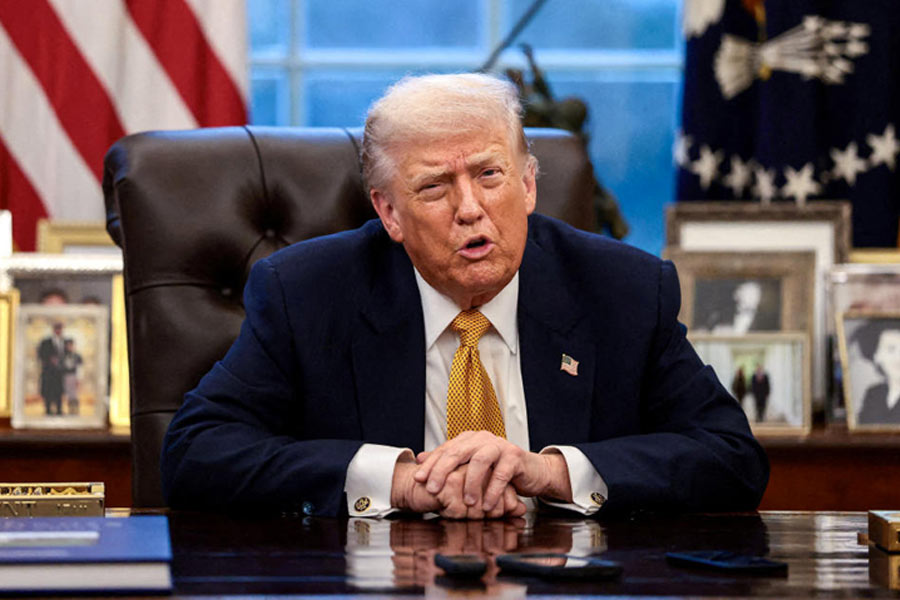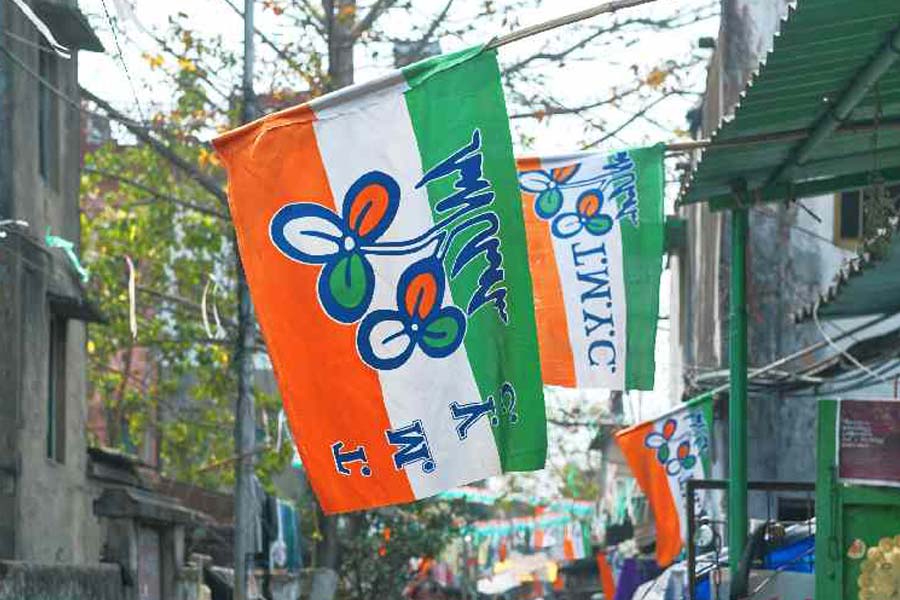
I had told you before release that October will not be a film… it will be an experience,” were Shoojit Sircar’s first words to t2 when we called him on Thursday to talk about October. Currently playing in theatres, Shoojit’s “personal story” about coming-of-age, coping with loss and acceptance of destiny is a film that alters the conventional Bollywood definition of love.
Like most, we loved October and couldn’t wait to chat with Shoojit about his film — starring Varun Dhawan and newcomer Banita Sandhu — that’s quickly built a place in the hearts of moviegoers and has also stacked up a neat profit at the box office.
Congratulations for the overwhelming response to October. For most, it’s opened up old wounds and yet been a cathartic experience. What are people telling you?
The biggest compliment that’s come for the film, according to me, is that people want to take Dan (played by Varun Dhawan) home. They want to hug Dan tight… they want to hug Shiuli (played by Banita Sandhu) and not let go of her. I think that’s happened because people have felt very close to these characters. They want to retain these characters in their memories and consciousness even after walking out of the film.
I felt the same emotions when I watched the Iranian film
A Separation… it won an Oscar. After watching it, I wanted to go to Iran and meet all the characters in the film… I wanted to see if they really exist.
Of course, as a filmmaker, you feel great joy when all the reviewers are on the same page, as has happened with October. Bole toh laabh nei that it doesn’t make a difference to me… of course, khushi hoy! (Laughs)
It may not have polarised the audience, but you would agree that some haven’t liked the film…
Yes, there are some people who didn’t get the film. But I was prepared for that. There are some who asked me, ‘Aami toh bujhlam na film ta… last-ey keno morey gelo?’ I didn’t know what to say because that’s the way the film was made. My intentions about where I wanted the film to go were clear from the beginning. Those who understood the emotions in it, I am grateful and happy. For those who didn’t, I just say, wait for my next film! (Laughs)
It’s a rare film that makes you smile even through its sadness. Was the thin line between making it heart-warming and heart-rending a tightrope to walk on?
Oh yes, it was very tough. The film hurts you a lot, but there’s also so much hope, especially when Dan finds Shiuli in the end. He picks up Shiuli’s shiuli plant and heads home. And I know that people in the audience want to stop him, be with him and comfort him… just because he’s such a dedicated and selfless person. You are absolutely right when you say it was a tightrope for both me and Juhi (Chaturvedi, the film’s writer) because we knew that the purpose of making this film wasn’t to depress anyone.
So many people have told me that the film had one of the best death scenes in our cinema… no drama, absolutely real. That’s how life is…. Like the day I heard about Irrfan (Khan, who is currently undergoing treatment for Neuroendocrine tumour), I was completely shattered. I just couldn’t process it… it came out of the blue. What I am saying is that life is like that… everything is transient and yet you have to keep it running normally every day.
I believe that like Dan, human beings are inherently selfless, that we are children even when we grow up. It’s life and circumstances that change us and make us selfish.

You had told us that October’s story stems from a very personal space...
Well, I went through what Dan goes through with my mother. This was in 2004, she was in a coma for more than three months and eventually she passed away. (Pauses) Those three-and-a-half months that I spent with her in hospital when she was lying in a comatose state was life-changing for me. A lot of things I wanted to tell my mom, which remained unsaid. When she was in a coma, I would talk to her thinking she was listening to me. I became like a child in front of her, in front of that situation… I had nothing to fight it with… it was life, it was destiny.
Also, my brief to Juhi was that the story had to bring in the angle of a mother and a child… the unconditional love that a mother has for her child and the pain she experiences when she sees her wither away.

Since it’s a story so personal to you, was there ever a time when you feared that Juhi wouldn’t feel the same emotions as you while writing it?
My film Shoebite (starring Amitabh Bachchan) that hasn’t released yet, deals with the same theme… someone in a comatose condition. And Juhi herself went through the same situation as I did with her mother, who was on the ventilator for a month or so.
Everyone who has seen a loved one suffer illness and has been helpless in the face of it will empathise with and understand what the film wants to say. When someone goes through that situation, life changes in ways you don’t even understand. Everyone faces the same dilemma — will the loved one come back? To pull the plug or not? What if there is some hope? We all have had people telling us to pull the plug, but you can’t… you have to keep fighting.
The twitching of the eye scene in the film… that happened to me. My mother’s eyes flickered one day and I ran to the doctor saying, ‘She flickered… she flickered… she flickered!’ But the doctor said it was nothing. So that hope would rise and get crushed within minutes.
Besides our personal experiences, we watched a lot of documentaries and spoke to people who had encountered such situations. What we realised that everyone has exactly the same story. Illness is a great leveller. You spend days and nights in the hospital even without realising it… that hospital becomes a world within a world for you. You have no other life… you become detached. It’s only you and the person lying in the ICU… nothing else matters.
And yet the best thing about the film is that it doesn’t judge people moving on, even when Dan decides not to…
Yes, it’s not judgemental at all… that was always our intention. Through October, I’ve tried to show that selfless caring doesn’t always mean two people need to be in a relationship. At the same time, it doesn’t question why others choose to go about their lives. It’s a choice, purely. And again, that’s how life is.
October doesn’t have a conventional narrative. Sometimes, it’s very random. Even the interval is not at a high point and there is no big twist. Were you worried people wouldn’t warm to it?
Yes, I knew that it would surprise a lot of people. Normally, we don’t write our films thinking of an interval… we think of the interval only when we sit at the edit table. Hollywood films don’t have an interval, but in Indian cinemas, they are cut randomly in the middle to make way for an interval. The randomness in October is very deliberate. When you show someone in a coma for over a year, things become random, everything becomes unsettled. That’s how we shot the film.
One day, I remember Varun telling me he wanted to say a line right in front of the camera. And I told him that the shot had already been taken. ‘But camera toh peechhey tha,’ he said, very shocked. I was like, ‘Na, na, hoye gechhe!’ (Laughs) You should have seen his face! But that’s how I make my films… an important dialogue doesn’t have to be said in your face. I made some parts of the film random deliberately because it gave me a chance to experiment with my craft, and there are many people who have also specifically liked that technique. But I also knew that some wouldn’t like this randomness.
October makes even the mundane — hospital visits to hotel shifts —engaging. How much will you credit your editor Chandrashekhar Prajapati for that?
As much as the cinematographer (Avik Mukhopadhyay) and the writer. October is a very difficult film to edit. This film was made at the writing stage and the edit table. My editor took a lot of time to understand the film. My first cut was almost four hours and he chopped and made it into a film less than two hours. He deserves a lot of credit.
Dan is not only a young man without purpose, he’s also full of angst. Didn’t you ever think of giving him a backstory?
I didn’t and I couldn’t. Because it’s impossible to be Dan. In today’s day and age, there can’t be a Dan.
You can have family members doing it, like (racing legend) Michael Schumacher’s wife is doing for him. He’s in a vegetative state and she’s selflessly looking after him. But Dan has no connection to Shiuli. I just thought of him as a simple boy in his early 20s moving through life. He’s not been corrupted by the world. He is a rebel, a revolutionary, like so many young people. But Dan has no purpose in life till Shiuli meets with that accident.
Varun is remarkable in the film, but for Banita it’s been a very brave debut. What made her the perfect Shiuli for you?
First would be the freshness in her face. Also, she’s very mature. She’s been born and brought up in Wales… this has been only her second trip to India. In her, I found a girl who could speak through her eyes… she has a lot of depth in her. Her dedication to the part was immense. That scene where she moves her eyes from right to left wasn’t easy. She practised it for almost six months! She did meditation, she watched documentaries… oi chokh diye onek kotha meyeta bole gelo! She would even surprise me while shooting. She would do such a great job that I would jump behind the camera… I would be so excited because she would constantly surpass my expectations. I would be like a kid, my crew had to hold my shirt and pull me back because I would be so excited! (Laughs) The kind of joy that the audience feels when Shiuli moves her eyeballs, I felt the same excitement.

How did you go about picking your side players? There are no known faces and yet so effective…
The credit for that goes to my casting director Jogi. He’s been with me for 20 years now. We needed to pick unknown faces so that the film becomes even more believable and the characters relatable. We hunted a lot. Gitanjali (Rao, who plays Shiuli’s mother) is a very famous animator. She’s not an actor, but had featured for about five seconds in a commercial I had directed 10 years ago. I remembered her and offered her the film and just told her to be herself. And she has such an expressive face that she really didn’t need to do anything else. The two kids (who play Shiuli’s siblings) are from Delhi… the best thing is that they all looked so correct... like a family.
The badminton scene in Piku, Dan riding away with Shiuli’s plant in October... Does the same philosophy of finding hope in hopelessness drive both films?
To some extent, yes. In Piku, I felt that them (Deepika Padukone’s Piku and Rana, played by Irrfan Khan) playing badminton was the right way to end the film. A lot of people asked me why I didn’t show more to their relationship… but that was up to the audience to interpret. Who knows where Piku and Rana ended up? (Smiles) In October, we had a lot of discussions… should Dan move on and find another girl? Then we thought this is the best way to end the film.
What next — football or the next film?
Football, right away! I am going to Singapore tomorrow to play a match with Abhishek (Bachchan), Arjun (Kapoor) and other members of the fraternity. My next film is on a revolutionary — Shaheed Udham Singh. Golpo bolte thakbo (smiles).










